What people said
These are the highlights of the DQF engagement process which gathered more than 1000 participants in the first year alone.
Ethos:
Focus on what matters for each community
Listen before asking
Connect planning committee, district councillors, neighbourhood forums, parish councils, adoption and budget controllers
Train senior councillors
Keep academic themes separate to the community debate
Include students and young people
Engage early, before design stages to have true input
Am I going to be listened to?
Make it clear to know where to find out more about engagement issues and events
Find out what are the concerns or reasons for mistrust and be honest
Bring different groups together
Moderate free speech but expect challenging views
Communication:
Will decision makers in NCC ultimately decide in accordance with policy?
How can people be reassured their views will count?
What is the engagement plan, how each event plays a role in the whole
How will we be kept informed?
Keep the language not too technical and where this is not possible, include explanations
Be open, ask everyone to share information and reports
Use promotional videos & Tweet live
Methods:
Reach out by popping in at community events throughout the city
Engage via Community Organisers
Know where communities are and how to reach to them
Use online platforms, flyers and face-to-face
Use community members to know when/how/who to invite
Plug into existing forums and community groups, align diaries
Make the most of existing societies and infrastructure
Identify or generate new advocates
Use the Urban Room
Bear in mind child care and other practicalities
Target different groups at different times and venues, especially young people
Gazeebos, food drinks music, social eating, local spaces, all helps bringing people together
Formulate a clear objective for each event to keep focus and set the pace
Establish groups and audiences
Use street champions, block champions to spread the word and gather new participants
Use ice breakers, set the tone, set rules
Use small focused discussion and larger events
Set a group where everyone is equal in the debate, no hierarchy

